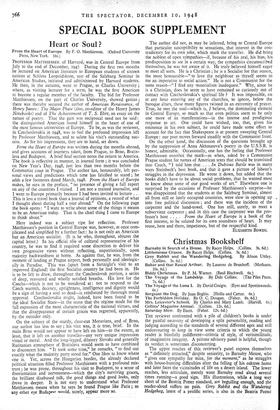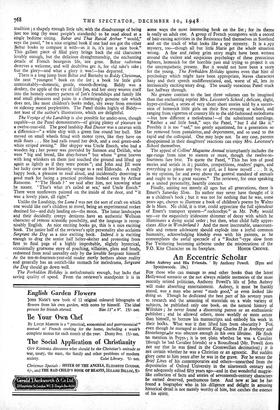Christmas Bookshelf Barnaby in Search of a House. By Racey
Helps. (Collins. 3s. 6d.)
Littlemouse Crusoe. By Racey Helps. (Collins. 3s. 6d.)
Grey Rabbit and the Wandering Hedgehog. By Alison Uttley.
(Collins. 3s. 6d.) Babar and that Rascal Arthur. By Laurent de Brunhoff. (Methuen.
10s. 6d.) Biddy Christmas. By P. M. Warner. (Basil Blackwell. 6s.)
The Voyage of the Landship. By Dale Collins. (The Pilot Press.
7s. 6d.)
The Voyage of the Luna I. By David Craigie. (Eyre and Spottiswoode.
6s.)
Sergeant the Dog. By Joan Begbie. (Hollis and Carter. 6s.)
The Forbidden Holiday. By O. C. Dougan. (Faber. 8s. 6d.) Mrs. Leicester's School By Charles and Mary. Lamb. (Harvill. 6s.)
Collins' Magazine Annual. (Collins. 12s. 6d.)
Saturday Slow. By Enett. (Faber. 12s. 6d.)
THE reviewer confronted with a pile of children's books is under the painful necessity of developing a split personality, reading and judging according to the standards of several different ages and still endeavouring to keep in view some criteria to which the young reader is blissfully indifferent—criteria of style, of verisimilitude, of imaginative integrity. A private advisory panel is helpful, though its verdict is sometimes disconcerting.
The upper reaches of this reviewer's panel express themselves as " definitely attracted," despite seniority, to Barnaby Mouse, who "gives one sympathy for mice, for the moment," as he struggles with house-hunting difficulties after the felling of his oaktree home and later faces the vicissitudes of life on a desert island. The lower reaches, less articulate, merely want Barnaby read aloud several times running—a good sign. His illustrations, while a long way short of the Beatrix Potter standard, are beguiling enough, and the reader-aloud suffers no pain. Grey Rabbit and the Wandering Hedgehog, latest of a prolific series, is also in the Beatrix Potter
tradition ; a shapely enough little tale, with the disadvantage of being just too long (by most people's standards) to be read aloud at a single bedtime sitting. Babar and That Rascal Arthur " would," says the panel, " be a nice original book if one had not got the other Babar books to compare it with—as it is, it's just a nice book." This gallant piece of filial piety brings back the old characters lovably enough, but the delicious draughtmanship, the enchanting details of French bourgeois life, are gone. Babar redivivus deserves a welcome, and will doubtless get it, for old sake's sake ; but the glory—and what a glory it was !—has departed.
There is a long jump from Babar and Barnaby to Biddy Christmas, the next " youngest " book on the list ; a book for little girls unmistakably—domestic, gentle, smooth-flowing. Biddy was a donkey, the apple of the eye of little Jan, and her story weaves itself into the homely country pattern of Jan's friendships and family life and small pleasures and pains in a charmingly genuine tale which does not, like most children's books today, shy away from emotion or sidestep moral perplexities. The Panel thinks highly of Biddy— not least of the author's illustrations, which are delightful.
The Voyage of the Landship is also possible for under-tens, though capable—as the Panel demonstrates—of giving plenty of pleasure to a twelve-year-old. The good landship Red Duster was a caravan with a difference—" a white ship with a green line round her hull. She moved on small wheels fitted with motor tyres, like they have on milk floats . . . She had rails round her deck, and a cool green-and- white striped awning." Her skipper was Uncle Enoch, who had a wooden leg ; her power was provided by Samson and Delilah, who were " big and broad, like dray-horses " but whose " great hooves with long whiskers on them just touched the ground and lifted up again as lightly as if they were ponies "; and John and Jill were her lucky crew on her leisurely voyage to a real Eldorado. A really happy book, a pleasure to read aloud, and incidentally deserving a good mark for facing a practical problem burked even by Arthur Ransome. " The Heads ? ' we said after him, not knowing what he meant. ` That's what it's called at sea,' said Uncle Enoch." There were sunflowers painted on the inside of the door, and " it was a lovely place, all right."
Unlike the Landship, the Luna I was not the sort of craft on which one would like one's children to travel, being an experimental rocket destined for—and duly landing on—the moon. The lunar landscapes and their decidedly creepy denizens have an authentic Wellsian character of remote scientific possibility, and the language is recog- nisably English. As nice exciting books go, this is a nice exciting book. The junior half of the reviewer's split personality also acclaims Sergeant the Dog as a nice exciting book. Indeed it is exciting enough to drag the senior half helter-skelter and protesting from first to final page of a highly improbable, slightly hysterical, occasionally gruesome story of poaching, villainies, plots and feuds, redeemed from total unreality only by the lovable Sergeant himself. As the ten-to-fourteen-year-old reader rarely bothers about reality and generally has an ostrich-like stomach for melodrama, Sergeant the Dog should go down well.
The Forbidden Holiday is melodramatic enough, but lacks that saving quality of speed. From the reviewer's standpoint it is in
some ways the most interesting book on the list ; for its theme is really an adult one. A group of French youngsters with a record of hair-raising activities in the Resistance find themselves in Scotland and on the track of what looks like a spy mystery. It is a .spy mystery, too—though all but little Marie get the whole situation wrong. A fine and and grim story might have been written around the violent and suspicious psychology of these precocious fighters, homesick for the horrible past and trying to project it on the unsympathetic present. But it would not have been a story for the young. The Forbidden Holiday ignores even that hint of psychology which might have been appropriate, leaves characters hazy and their speech undifferentiated, and, worst of all, lets its intrinsically exciting-story drag. The usually voracious Panel stuck fast halfway through.
No greater contrast to the last three volumes can be imagined than that enchanting reprint Mrs. Leicester's School ; delicate, slight, hyper-civilised, a series of very short short stories told by a succes- sion of homesick little girls on their first evening at school, and ranging from vignettes of country life to the old-fashioned melodrama —but how different a melodrama!—of the substituted nurslings. " Rather a sad little book," says the Panel, " but I did like it." Possibly it is too " sad," too gently aquatinted, for a generation so far removed from pantalettes, and deportment, and so used to the rapid and the colloquial. One may hope not. In any case, parents disappointed in their daughters' reactions can enjoy Mrs. Leicester's School themselves.
The appeal of Collins' Magazine Annual triumphantly includes the age-range from nine to sixteen or more, though the twelve-to- fourteens fare best. To quote the Panel, "This has lots of good stories and serials in it ; puzzles, competitions, readers' pages, and everything to please any boy or girl, as I know myself . . . It is, in my opinion, far and away above the general standard of annuals and ought to be a great success." The reviewer, for once speaking as a united personality, heartily concurs.
Finally, uniting not merely all ages but all generations, there is Emett's Saturday Slow. Its author may never have thought of it as a children's book ; but it was not for nothing that he was, some years ago, chosen to illustrate a book of children's poems by Walter de la Mare. No child, it is true, could appreciate the full splendour of Emett's transport system—" rockcockyo " as Mr. PoHy would say—or the exquisitely iridescent shimmer of decay with which he illuminates a dying social order • but then, what child fully appre- ciates Alice in Wonderland ? And the most inscrutable, unaccount- able and remote adolescent should explode into a joyful common humanity, acknowledging kinship even with his parents, as he contemplates the awful spectacle of a "Rocket "-type slow from Far Twittering becoming airborne under the ministrations of the
F.O. Kite Character on its footplate. HONOR CROOME.















































 Previous page
Previous page